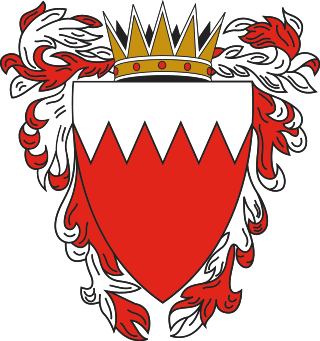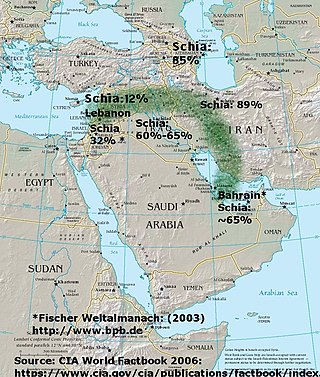
Bahrain plays a modest, moderating role in regional politics and adheres to the views of the Arab League on Middle East peace and Palestinian rights. Since achieving independence in 1971, Bahrain has maintained friendly relations with most of its neighbours and with the world community. It generally pursues a policy of close consultation with neighbouring states and works to narrow areas of disagreement.

The Cooperation Council for the Arab States of the Gulf, also known as the Gulf Cooperation Council, is a regional, intergovernmental, political, and economic union comprising Bahrain, Kuwait, Oman, Qatar, Saudi Arabia, and the United Arab Emirates. The council's main headquarters is located in Riyadh, the capital of Saudi Arabia. The Charter of the GCC was signed on 25 May 1981, formally establishing the institution.

Arab-Persians are people who are of both mixed Arab and Persian ethnic or cultural background, which is common in Iran, Kuwait, Iraq, Bahrain, and to a lesser extent, Lebanon and Syria.

The Arab states of the Persian Gulf or the Arabian Gulf states refers to a group of Arab states bordering the Persian Gulf. There are seven member states of the Arab League in the region: Bahrain, Kuwait, Iraq, Oman, Qatar, Saudi Arabia, and the United Arab Emirates. Yemen is bound to the six countries of the Gulf Cooperation Council, based on history and culture.

Kuwait Petroleum Corporation is Kuwait's national oil company, headquartered in Kuwait City.

The dynamic between the League of Arab States and the Islamic Republic of Iran has been ambivalent, owing to the latter's varying bilateral conduct with each country of the former. Iran is located on the easternmost frontier of the Arab League, which consists of 22 Arab countries and spans the bulk of the Middle East and North Africa, of which Iran is also a part. The Arab League's population is dominated by ethnic Arabs, whereas Iran's population is dominated by ethnic Persians; and while both sides have Islam as a common religion, their sects differ, with Sunnis constituting the majority in the Arab League and Shias constituting the majority in Iran. Since Iran's Islamic Revolution in 1979, the country's Shia theocracy has attempted to assert itself as the legitimate religious and political leadership of all Muslims, contesting a status that has generally been understood as belonging to Sunni-majority Saudi Arabia, where the cities of Mecca and Medina are located. This animosity, manifested in the Iran–Saudi Arabia proxy conflict, has greatly exacerbated the Shia–Sunni divide throughout the Muslim world.
Anti-Iranian sentiment or Iranophobia, also called anti-Persian sentiment or Persophobia, refers to feelings and expressions of hostility, hatred, discrimination, or prejudice towards Iranian people on the basis of an irrational disdain for their national and cultural affiliation. The opposite phenomenon, in which one holds notable feelings of love or interest towards Iranian people for the same reasons, is known as Iranophilia or Persophilia.

The Shia Crescent is the notionally crescent-shaped region of the Middle East where the majority population is Shia or where there is a strong Shia minority in the population.
Islam is historically divided into two major sects, Sunni and Shia Islam, each with its own sub-sects. Large numbers of Shia Arab Muslims live in some Arab countries including Lebanon, Yemen, Bahrain, Iraq, Saudi Arabia, Kuwait, Oman, the UAE, and Qatar.
This article deals with territorial disputes between states of in and around the Persian Gulf in Southwestern Asia. These states include Iran, Iraq, Kuwait, Saudi Arabia, Bahrain, Qatar, the United Arab Emirates (UAE), and Oman.

Bilateral relations between Iran and Saudi Arabia have been strained over several geopolitical issues, such as aspirations for regional leadership, oil export policy and relations with the United States and other Western countries. Diplomatic relations were suspended from 1987 to 1990, and in 2016 for seven years following certain issues like the intervention in Yemen, Iran embassy bombing in Yemen, incidents in 2015 Hajj, the execution of Nimr al-Nimr, the attack on the Saudi diplomatic missions in Iran. However, in March 2023, after discussions brokered by China, Iran and Saudi Arabia agreed to reestablish relations.
Achomi, also called Khodmooni, Lari, or Larestani, are an Iranian sub-ethnic group of Persians who inhabit primarily in southern Iran in a region historically known as Irahistan. They are predominantly Sunni Muslims, with a Shia minority.
Shia Islam constitutes a significant minority in Kuwait. In 2001, the US Department of State reported that there were 300,000 Shia Kuwaiti citizens and 820,000 Kuwaiti citizens in total thus Shias formed 36.5% of the Kuwaiti citizen population. In 2002, the US Department of State reported that Shia Kuwaitis formed 30-40% of Kuwait's citizen population, noting there were 525,000 Sunni citizens and 855,000 Kuwaiti citizens in total. In 2004, there were 300,000-350,000 Shia Kuwaiti citizens and 913,000 Kuwaiti citizens in total. The Strategic Studies Institute reported that they constitute 40% of the population in 2008.
'Ajam of Kuwait are Kuwaiti citizens of Iranian descent. The majority of Shia Kuwaiti citizens are of Iranian descent, although there are Ajam Kuwaitis who are Sunni.

Iran and Saudi Arabia are engaged in an ongoing struggle for influence in the Middle East and other regions of the Muslim world. The two countries have provided varying degrees of support to opposing sides in nearby conflicts, including the civil wars in Syria and Yemen; and disputes in Bahrain, Lebanon, Qatar, and Iraq. The struggle also extends to disputes or broader competition in other countries globally including in West, North and East Africa, South, Central, Southeast Asia, the Balkans, and the Caucasus.

The Saudi–led intervention in Bahrain began on 14 March 2011 to assist the Bahraini government in suppressing an anti-government uprising in the country. The intervention came three weeks after the U.S. pressured Bahrain to withdraw its military forces from the streets. As a decision by Gulf Cooperation Council (GCC), the intervention included sending 1,000 (1,200) troops with vehicles from Saudi Arabia at the invitation of the Al-Khalifa ruling family, marking the first time the GCC used such a collective military option for suppressing a revolt.

Bilateral relations exist between the countries of Bahrain and Iran. Since the 1979 Iranian Revolution, relations between the two countries have been strained over various geopolitical issues such as the interpretations of Islam, aspirations for leadership of the Islamic world, and relations with the United States, Europe, and other Western countries. In addition, Iran has been severely critical of Bahrain for hosting the United States Fifth Fleet within the Persian Gulf at the Naval Support Activity Bahrain base.

Iran–Qatar relations refer to the bilateral relations between the Islamic Republic of Iran and the State of Qatar. Iran has an embassy in Doha while Qatar has an embassy in Tehran. Qatar and Iran have close ties.

Saudi Arabia–Qatar relations refers to the current and historical relationship between the Kingdom of Saudi Arabia and the State of Qatar. Prior to 2017, the two countries maintained cordial ties. Qatar was mainly subservient to Saudi Arabia in matters relating to foreign policy. Hamad bin Khalifa Al Thani's assumption of power saw Qatar reclaim its sovereignty in foreign affairs, often diverging from Saudi Arabia on many geopolitical issues. In 1996, the Qatari government launched Al Jazeera in a bid to consolidate soft power. One of the most watched news stations in the Arab world, Al Jazeera proved to be a wedge in the two's bilateral relations as it routinely criticized Saudi Arabia's ruler. The network also provided a platform for Islamist groups which are considered a threat to Saudi Arabia's monarchy.

The Qatar–Saudi Arabia diplomatic conflict refers to the ongoing struggle for regional influence between Qatar and the Kingdom of Saudi Arabia (KSA), both of which are members of the Gulf Cooperation Council (GCC). It is sometimes called the New Arab Cold War. Bilateral relations have been especially strained since the beginning of the Arab Spring, that left a power vacuum both states sought to fill, with Qatar being supportive of the revolutionary wave and Saudi Arabia opposing it. Both states are allies of the United States, and have avoided direct conflict with one another.
















